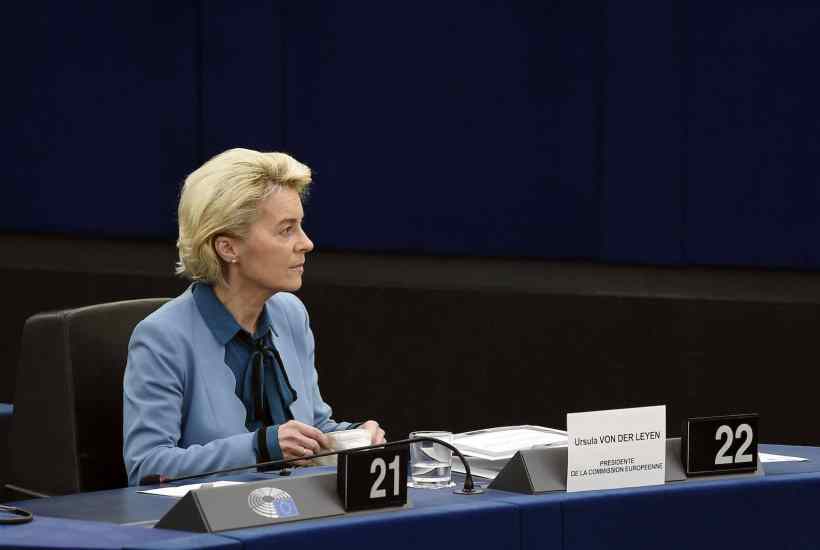Storm clouds looming over the EU’s ‘rule of law’ dispute turned a shade darker on Wednesday. The European Court of Justice rejected challenges from Hungary and Poland against a controversial budget mechanism linking adherence to democracy and EU funding.
In an indication of the significance of the ruling for the bloc’s future, the verdict was the first ever to be broadcast live from the court. The European Commission will now come under intense pressure to apply the rule of law mechanism and withhold long-term budget funds for Hungary and Poland, along with the pandemic recovery funds it has already refused to hand over to those states.
But the escalation of the conflict will also change the political landscape in Hungary and Poland, making the looming elections even more crucial for those countries’ continued membership of the EU. In Poland, rule of law concerns relate to the independence of the judiciary, which the EU believes is threatened by legal reforms to the courts. The Polish legal dispute reached its apogee last October when the country’s constitutional tribunal ruled that Polish law has primacy over EU law.
In Hungary the issue at stake is corruption — if the EU is to be believed, that is. Hungary’s Fidesz leadership begs to differ, arguing that financial threats against Hungary are a response to its conservative cultural agenda. The country’s Child Protection Act, limiting the dissemination of LGBT content, is portrayed as the real reason for Brussels’ animosity. Hungarian justice minister Judit Varga branded the ECJ’s ruling ‘a politically motivated judgment because of the Child Protection Act’ and ‘living proof that Brussels is abusing its power’.
Viktor Orbán’s government also suggests that the EU is trying to influence the Hungarian elections on 3 April. It’s undeniable that most politicians in Brussels would rejoice at an Orbán defeat; but holding out for a change of regime in Budapest is a dangerous game to play. The political atmosphere in Hungary is getting nastier, and the EU will find that intensified threats feed a sense of defiance as much as fear.
If Orbán loses in April, a new government will try to answer the EU’s rule of law concerns (although experiences in other central European countries suggest promises to fix corruption should always be taken with a heavy dose of salt). But if he wins after Wednesday’s ruling, he’ll be able to claim a clear public mandate for the rejection of EU overreach; a loud and clear Hungarian ‘no’ to the EU’s ideological ‘Jihad’ against traditional Hungarian culture, as he called it during a state of the nation address last weekend.
The situation is different in Poland. The Polish dispute constitutes a more fundamental challenge to the EU order than the Hungarian one, but it’s also of less domestic political urgency. Faced with record inflation and the prospect of Russian aggression to the east, the country’s leaders have recently appeared reluctant to multiply their problems by fighting with the EU — for now, at least.
President Andrzej Duda flew to Brussels last week to discuss a proposal for disbanding the country’s disciplinary chamber for judges, which is at the centre of the legal rule of law dispute. Some claim the proposal will turn out to be little more than a rebranding exercise — but a calculation seems to have been reached in Warsaw that with elections still a year and a half away, the fight for legal sovereignty can be shelved in an attempt to unlock EU funds and restore balance to the economy.
Nonetheless, the ECJ’s green light for the rule of law mechanism means a significant escalation in both countries’ disputes with Brussels. And for both Hungarian and Polish governments, the general public’s response to economic threats will prove all-important.
As the EU juggernaut slowly transforms intimidation into action, it becomes ever clearer that a vote for Fidesz in Hungary, or the United Right in Poland, is a vote against EU control. It also clarifies the connection between rejecting those parties and subscribing to ‘EU values’ in exchange for money.
The democratic choices of the Hungarian and Polish people have therefore become of paramount importance to the future of the rule of law dispute. After Wednesday’s ruling, right-wing governments will interpret victory as approval for their stance against the EU — and as an encouragement to double down on rebellious policies.
This is all grist to the mill of progressive MEPs longing for a make-or-break moment in the EU’s relations with conservative member states. Yet curiously Ursula von der Leyen excused herself from the European parliament debate on the rule of law verdict — that reveals a telling reticence on behalf of the European Commission. It may now be dawning on the bloc’s lawmakers that their rule of law crusade brings a whole new significance to Hungarian and Polish elections; votes that could, in the face of aggression, make questions over continued membership of the EU far more urgent.
Got something to add? Join the discussion and comment below.
Get 10 issues for just $10
Subscribe to The Spectator Australia today for the next 10 magazine issues, plus full online access, for just $10.


















Comments
Don't miss out
Join the conversation with other Spectator Australia readers. Subscribe to leave a comment.
SUBSCRIBEAlready a subscriber? Log in